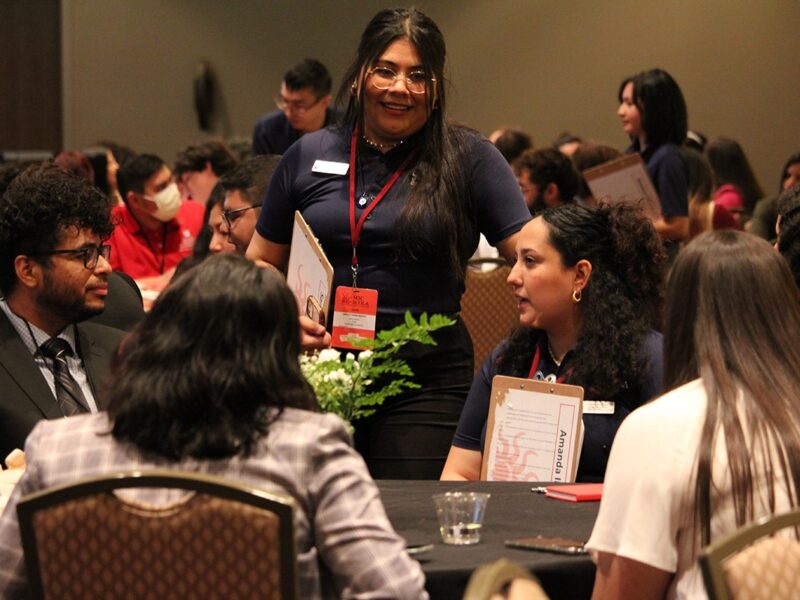Study Suggests Psychological Reasons For The Math Gender Gap

We’ve all heard the stereotype that boys are better at math and in fact, men are more likely than women to pursue careers in STEM (science, technology, engineering and mathematics) fields. But is it really a matter of male math superiority? According to researchers at Texas A&M University, what may be happening is that men are overestimating their abilities, a phenomenon known as “positivity bias.”
In their paper “Gender Gaps in Overestimation of Math Performance,” published in the journal Sex Roles (June 2015), Texas A&M Professor of Psychology Heather Lench and her co-authors, examined whether men would demonstrate a larger positivity bias in evaluating their past math performance than women. They further explored whether that positivity bias could account for the gender gap in interest in pursuing math courses and careers.
“Positivity bias is a bias toward being more positive than can be justified by reality,” says Lench, who specializes in emotion and cognition, decision-making, forecasting and optimism. “These biases can arise about the past, present or future. In this particular article we focused on positivity bias in people’s evaluations of their past performance. In other words, the extent to which people thought they had performed better than they actually had.”
The research team gave college students, mostly freshmen, a math test with items taken from the SAT, and then asked how they thought they had done on the test. “We evaluated the difference between how they thought they had done and how they had actually done,” Lench explains. Participants also reported on their past experiences with math, their general sense of math self-efficacy (i.e. how generally competent they believe they are in math), and their interest in pursuing math courses and careers.
Lench says the investigation revealed the male subjects overestimated how well they had done, whereas women were fairly accurate in estimating their performance. “This suggests that men are demonstrating a positivity bias in their evaluation of their math performance that women do not demonstrate,” she notes.
Turns out men have been found to hold a number of positivity biases to a greater extent than women, Lench reveals, including that they will be relatively unaffected by various health risks – something that would normally be considered a bad thing. But, says Lench, in the case of positivity bias in math performance, men may have stumbled on to something good.
“Although positivity bias might normally be considered a bad thing in the sense that it’s inaccurate, positivity bias in math performance completely accounted for the relationship between gender and intent to pursue math courses and careers,” she says. “Math is a difficult subject for most people, and we speculate that positivity biases might help bolster people as they are initially struggling to master math concepts.”
Previous positive experiences with math may also play a role in whether or not a person pursues a STEM career, Lench adds. “In our study, women who reported having previous positive experiences with math were more likely to show a positivity bias, but this relationship was not present for men. This suggests that positive math experiences might be particularly important for women in the sense that it bolsters this positivity bias in evaluating past math performance.”
Lench says the stereotype that boys are better at math seems to actually feed on itself. “This stereotyping even affects people’s implicit categorization of men and women (this is one way to detect stereotypes that people might even be unaware of), as women categorize math as more negative than men, in part because they categorize math as ‘male.’”
The problem also accounts, at least in part, for gender differences in pay, Lench notes. “Because fewer women go into STEM fields, and STEM professionals are paid more than people with other degrees, this discrepancy contributes to the fact that women, on the whole, earn less than men.”
When designing interventions to increase women’s interest in math courses and careers, Lench points out the importance of distinguishing between confidence and positivity bias. “Past research has inferred that women lack confidence in their math skills and are therefore less likely to pursue math,” she notes. “Our findings suggest that the gender gap is not about confidence or a general sense of math self-efficacy, but instead it’s about how inaccurate people are in estimating their performance. So any interventions would need to be aimed at enhancing positivity bias, not general confidence about math.”
Lench’s co-authors on the paper are Kathi Miner, professor in the Texas A&M Department of Psychology; Shane Bench, postdoctoral researcher, University of Washington; Jeffrey Liew, professor in the Texas A&M Department of Educational Psychology; and Sarah Flores, a master’s student at Texas A&M during the project, now a research analyst at College of the Mainland.
Media contact: Lesley Henton, Texas A&M Division of Marketing & Communications.





